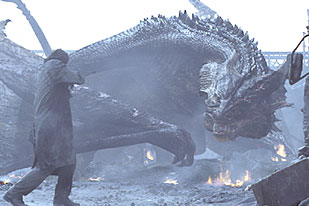1) Lord of the Rings Enthusiasts
The largest group of 348 respondents comprised enthusiastic and eager Lord of the Rings fans who expressed faith in Peter Jacksons genius as a gifted filmmaker, and affirmed his unique ability to do justice to the complex story world of The Hobbit. This group expressed a high level of anticipation for this film, which theyd been waiting many years for, and eagerly looked forward to returning to the wonderful world of Middle Earth. They believed that Peter Jackson's fundamental motivation in making another trilogy was creative rather than financial, and that the Tolkien corpus was so extensive that there was easily enough material to justify extending The Hobbit. This group had considerable Tolkien literacy (having read The Hobbit on average 8 times) and special affinity for Jackson's film adaptations of Tolkien's work, having seen the LoTR films on average 19 times. 92.5% of these respondents said it was "extremely" or "very important" for them to see The Hobbit.
2) Angry anti-fans
24 respondents expressed the opposite viewpoint and were highly critical of what they saw as the destructive aesthetic (and political) roles played by Peter Jackson in bringing the Lord of The Rings and The Hobbit to the big screen. This group was especially critical of the decision to make a trilogy, which they considered purely commercially driven, and they were not impressed by what they had seen and heard about the film so far in terms of additions and changes that diverged from Tolkiens original vision. They believed technological innovations were likely to compromise the cinematic quality of The Hobbit, and expressed a lack of faith in Jacksons creative efforts, while also rejecting the idea that no other director could do justice to The Hobbit. They lamented the damage done to the Tolkien corpus by what they saw as an immature and artistically tone-deaf director catering to the lowest common denominator. Many among this group especially New Zealanders - criticized Jacksons actions during The Hobbit employment dispute. Only 4% of these respondents considered it "extremely" or "very important" to see the film and 40% were not planning to see the film at all despite many having a high degree of familiarity with both the book and the LoTR film trilogy. These respondents were on average 12 years older (46 years) than our enthusiastic fans (34 years), and half of them were New Zealanders.
3) Cautious Tolkien fans
Most of the 139 respondents affiliated with this viewpoint defined themselves as Tolkien fans, and their interest in the film was primarily motivated by their deep affection for The Hobbit as one of their favorite books (read 12 times on average). These respondents were deeply concerned about the films fidelity to the original storyworld. They wanted the film to be a perfect adaptation of a book they cared deeply about, but also feared they might end up disappointed. They also harbored nostalgic memories of reading The Hobbit at a younger age, so their view of "the spirit of the book" was caught up with their memories of childhood. For this group, the film promised to be a major movie event and they especially looked forward to seeing the film with family or friends. And while this group had seen the LoTR films on average 11 times and expressed general approval for Jackson's version of the Lord of the Rings, they did not self-identify as LoTR film fans. They were very eager to return to Middle Earth, and 85% of them considered it "extremely" or "very important" to see The Hobbit. 290 respondents fell somewhere between being cautiously optimistic Tolkien fans, and eager and enthusiastic LOTR fans.
4) Celebrity Lovers
A small group of 15 individuals constitutes our fifth group, and these were closely associated with a larger group of 56 respondents who were both Celebrity lovers and Lord of the Rings enthusiasts. All 15 of the true celebrity lovers were female, along with 93% of those who were simultaneously enthusiasts. Their average age was 41 years. This group does not primarily care about Tolkien's novel, The Hobbit, although members had read it on average four times. Their exposure to the LoTR film trilogy was lower, having seen it on average, twice. They strongly disagreed that The Hobbit was one of their favorite books. Rather, their primary interest in The Hobbit related to their affection for one of the films stars. True celebrity lovers were very happy that one of their favourite actors featured in the film (most often, Richard Armitage), and strongly affirmed the casting decisions. The New Zealand landscapes and the excitement of being part of a major cinematic event were also key attractions for this group.
5) Nervous investors
A group of 34 respondents were nervous investors, while another 16 were also LOTRs enthusiasts. Notably, 82% of true investors and 73% of those who were investor- enthusiasts were New Zealanders. This group had less exposure to The Hobbit (having read it twice on average) and the LOTRs trilogy (viewed an average of three times). Only 12% of nervous investors believed it was "extremely" or "very important" to see The Hobbit film, in contrast to 81% of investor-enthusiasts. Investors were very concerned about the evolving reputation of the film and how this might influence its commercial success. They agreed strongly that the film would have positive economic benefits locally, and could thus understand the rationale for government support. But they remained concerned about the Hobbit labour issue, and fully agreed that the conversion of The Hobbit into a trilogy was primarily aimed at increasing box office takings. This group was sceptical about the hype and speculation surrounding the film, and while they strongly disagreed that Peter Jackson was a sloppy director, they moderately disagreed that only Peter Jackson could properly bring The Hobbit to the screen. Investor-enthusiasts were mainly Tolkien or LoTR film fans and were more certain of the economic benefits that would flow from The Hobbit, while feeling very proud of New Zealands involvement in this major film production.









